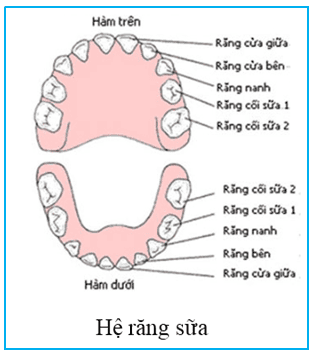Assoc. Prof, Huynh Thoai Loan, MD. This article has been professionally consulted by Assoc. Prof, Huynh Thoai Loan, MD, Head of the Pediatrics - Neonatology Department, Vinmec Central Park International General Hospital. He is one of the leading experts in Pediatrics and Neonatology in Ho Chi Minh City, with nearly 30 years of experience in examining and treating pediatric endocrine disorders, pediatric nephrology, and other pediatric and neonatal issues.
Milk teeth usually start to emerge when a child is about 6 months old and are fully completed after 2.5 to 3 years. However, the timing of the emergence of milk teeth can vary within a 1-year range. Therefore, if a 7-month-old child has not yet grown teeth but is developing normally, parents should not be too worried, as this could simply be a natural delay in teething.
1. Teething Timeline in Children
In children, typically all 20 primary teeth are formed and located in the jawbone. After birth, it takes some time before these teeth begin to emerge from the jawbone and gums. Each child usually needs 2.5 to 3 years to have all 20 primary teeth fully grown.
Specifically, the sequence and timing of primary teeth eruption in children are as follows:
- From 6 to 9 months: Four central incisors. The first milk tooth typically appears around the 6th month and in the lower jaw. Usually, the first tooth causes discomfort, and the baby may cry more, refuse to nurse, and have a mild fever. Some children might even experience slight diarrhea. The two upper central incisors will emerge around the 8th month.
- From 7 to 10 months: Two lateral incisors. The lower lateral incisors tend to appear later, around the 16th month.
- From 12 to 14 months: Four primary molars. After the incisors have fully emerged, the molars begin to appear. At this stage, mothers should pay more attention to the child's oral care to prevent dental diseases.
- From 16 to 18 months: Four canine teeth. The upper canine teeth will appear, filling the gap between the incisors and molars. The two lower canine teeth will appear later.
- From 20 to 30 months: The last four primary molars. The final two molars in the lower jaw will appear, followed by the last two molars in the upper jaw.

2. Why Do Children Experience Delayed Teething?
In fact, some babies may grow their first two central teeth as early as 4 to 5 months old, while others may experience them later, around 9 to 10 months old. Therefore, according to the timeline above, if a 7-month-old baby has not yet grown teeth, it is not considered too late. Even if a baby is 7.5 months old and still hasn't grown teeth, parents should not be overly worried.
If a baby is experiencing delayed teething but is still developing well both physically and mentally, it is likely just a physiological delay in teething and not a cause for concern.
However, if the baby also shows other signs such as delayed weight gain, lack of height growth, poor appetite, or other symptoms like a “sunken fontanel” or thinning hair, it would be advisable for parents to take the child to a reputable pediatric clinic or hospital for further examination.
Some other reasons for delayed teething in 7-month-old children include:
- Genetics
- Premature birth
- Late introduction of solid foods: If parents introduce solid foods too late, the gums and tooth buds may not be stimulated enough through chewing and swallowing reflexes.
- Dietary issues: If a child suffers from malnutrition, is growing slowly, or is lacking in essential nutrients such as calcium, vitamin D, and other necessary vitamins, this may delay teething.
Nutrition is a key factor that impacts the teething process in children, and it is something parents are highly concerned about.

When a child experiences delayed teething along with other signs of poor nutrition, such as slow weight and height development, and symptoms of rickets like poor sleep, sudden crying, fainting episodes, night sweats, a flattened skull, a sunken chest, and a wide fontanel, delayed teething may be due to rickets. In this case, it is important to improve the child's daily nutritional intake.
In some cases, delayed teething may be caused by a calcium deficiency, which is essential for the development of tooth buds. The main food source for babies in the early stages of life is breast milk, which is typically rich in calcium. However, if the mother’s diet lacks adequate nutrition, the quality of breast milk may decrease.
Additionally, solid foods for babies should not have an excessive amount of phosphorus (which is abundant in fruits and vegetables), as a high ratio of phosphorus can interfere with calcium absorption.
Vitamin D is necessary for calcium absorption and can be sourced from both food and sunlight. For infants, vitamin D from sunlight is especially important. Proper sunbathing helps improve the development of bones and teeth, making the child healthier.
Parents can consult a nutrition expert for guidance on their child’s diet. Additionally, to be more certain, parents can take their baby to the pediatric department of a hospital for a check-up and ask for the doctor’s opinion. If any abnormalities are found, the doctor may suggest an X-ray or additional tests to determine the exact issue.
In addition, parents should ensure their child is receiving essential micronutrients such as zinc, lysine, chromium, selenium, and vitamin B1 to meet their nutritional needs. These vitamins and minerals can also aid digestion, improve nutrient absorption, and help address issues with poor appetite, making it easier for the child to eat well. Parents may choose to supplement their child's diet with natural food sources and supplements for better absorption.
The most important thing is that improving symptoms in a child may take time. Using multiple supplements at once or frequently changing supplements in a short period may overwhelm the child’s digestive system, which is not ideal. Therefore, parents need to be patient and consistent in supporting their child and regularly check the website vinmec.com for useful baby care information.
LAMINKID I Health Supplement: This product is designed to supplement essential micronutrients and vitamins for the body. It supports digestion, enhances nutrient absorption, and improves appetite in children. It also boosts the child’s immunity, helping to reduce the risk of illnesses caused by a weak immune system, such as upper respiratory infections and the flu.
Target Audience:
- Children with poor appetite, low food absorption, underweight, malnutrition, or slow development.
- Children with weak immunity, recovering from illness, or frequently suffering from upper respiratory infections or the flu.
Product Quality Responsibility:
Elepharma Pharmaceutical Joint Stock Company
9 Trương Công Giai Street, Group 17, Dịch Vọng Ward, Cầu Giấy District, Hanoi City, Vietnam
(Phone) 1800 6091; (Email) info.elepharma@gmail.com
For more information about the product, visit: LAMINKID on Vinmec
Register for nutrition advice for your baby at: Vinmec Nutrition Consultation
To arrange an appointment, please call HOTLINE or make your reservation directly HERE. You may also download the MyVinmec app to schedule appointments faster and manage your reservations more conveniently.









